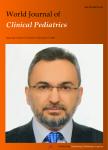Zinc supplementation as an adjunct to standard therapy in childhood nephrotic syndrome-a systematic review
Zinc supplementation as an adjunct to standard therapy in childhood nephrotic syndrome-a systematic review作者机构:Department of PediatricsAll India Institute of Medical Sciences Department of Pediatrics All India Institute of Medical Sciences
出 版 物:《世界临床儿科杂志》
年 卷 期:2016年第5卷第4期
页 面:383-390页
学科分类:1002[医学-临床医学] 100202[医学-儿科学] 10[医学]
主 题:Nephrotic syndrome Pediatric Relapse Zinc Micronutrient
摘 要:AIM To evaluate the role of zinc as add on treatment to the recommended treatment of nephrotic syndrome(NS)in *** All the published literature through the major databases including IVledline/Pubmed,Embase,and Google Scholar were searched till 31 st December *** lists from the articles were reviewed to identify additional pertinent *** papers concerning the role of zinc in childhood NS were reviewed by the authors,and the data were extracted using a standardized data collection *** trials(RCTs) comparing zinc vs placebo was *** of zinc was studied in both steroid sensitive and steroid dependent/frequent relapsing *** primary outcome measure was the risk of relapse in 12 *** secondary outcome measures were mean relapse rate per patient in 12 mo,mean relapse rate per patient in 6 mo,risk of infection associated relapse in 12 mo,cumulative dose of steroids in two groups,mean length of time to next relapse,adverse effects of therapy,and change in serum zinc *** Of 54 citations retrieved,a total of 6 RCTs were *** was used at a dose of 10-20 mg/d,for the duration that varied from 6-12 *** to placebo,zinc reduced the frequency of relapses,induced sustained remission/no relapse,reduced the proportion of infection episodes associated with relapse with a mild adverse event in the form of metallic *** GRADE evidence generated was of very low-quality.CONCLUSION Zinc may be a useful additive in the treatment of childhood *** evidence generated mostly was of very low-quality.We need more good quality RCTs in different country setting as well different subgroups of children before any firm recommendation can be made.



